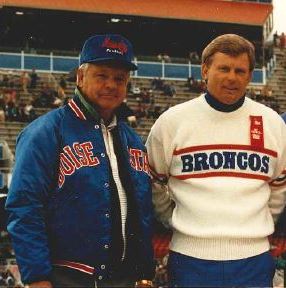
“Stay in the game and finish strong.”
These words to Mentor Fathers from Skip Hall, former head football coach at Boise State University, resonate on and off the field. As “Fathers in the Field” investing our time and life with fatherless boys, the exhortation encourages faithfulness and commitment as mentors.
“Men stepping into a mentorship role are key in the lives of boys who will one day become men and not know how to be men. As my current mentor, Pastor Chuck Swindoll, taught me, people are attracted not persuaded. Fathers in the Field attracts and captures the hearts of abandoned boys who desire a father-like relationship built on trust, acceptance and love.”
Skip is an advocate for the fatherless because he is fatherless. He ultimately lost his father to alcohol addiction, which led to divorce. His earliest memory is of his mom holding a knife to his father’s throat threatening to use it if he didn’t stop drinking. Skip was four years old.
“This was traumatic at such a young age,” recalled Skip, remembering back 66 years. “The bottle got the best of my dad. My mom couldn’t take it anymore so she divorced him. We moved from Minnesota to Seattle, WA where my mom remarried several years later only to have the same scenario played out in her life. She divorced my alcoholic stepfather after four years of marriage when I was 15.”
As Skip grew up in the 1940s and 50s in a culture before fatherlessness became an epidemic, he coped and covered his woundedness by being the toughest boy in school and second to none in his year-round athletic pursuits.
“I was making up for what I was lacking at home. So many boys, like me, mask the pain. Being a stellar athlete was my escape. I carried around a quiet anger as I pursued winning to overcome my loss.”
Oblivious at the time to the importance of a father, Skip leaned into the guidance and leadership of his coaches, the only positive male role models he had in his young life. “Sports became my therapy and coaches became my ‘dads.’”
One such role model was Skip’s high school football coach, Charlie Basch, whom he met as a sophomore in 1960. Coach Charlie, who will be 88 years old this year, had a tremendous influence on Skip’s life. “He lived his life out in front of me. He was authentic and encouraging like a good mentor should be. He made me want to be a coach. Looking back, I became like the man who was my role model and mentor at such an impressionable age.”
His coach’s relationship with the Lord didn’t go unnoticed nor was it wasted on Skip, but it took years before he gave his life to the Lord at age 35. It happened soon after his team at the time, the University of Washington Huskies, beat the Michigan Wolverines in the 1978 Rose Bowl. In the midst of all the gridiron glory, life change came in the form of a question from his wife.
“My wife asked me, ‘When you stand before the Lord, what will you say were the most important relationships and accomplishments in your life?’ Our team had just returned home to Seattle to a hero’s welcome and the keys to the city, yet I knew with that question it wouldn’t be about the championships or how many All-Americans I coached. It would be about the Lord and the relationships I built within my sphere of influence and with my wife and family. The question brought me to my knees.”
Skip described the moment like being hit by a 300-pound defensive end. He woke up from his complacent spiritual habits of going to church as a “two-timer” – only attending at Easter and Christmas. It was then Skip began the journey of becoming to his players what his most influential male role model was to him – a man of integrity, strength and genuine faith first and a football coach second.
Coaching the last half of his 30-year football career as a Christian was in stark contrast to his mindset during the first 15 years. “I wasn’t always in hot pursuit of a win. It became about the development of my players and how I treated them. I strived to coach ‘em up, not down.”
During Skip’s first season as head coach at Boise State University in 1987, he flew Coach Charlie to his first game in Bronco Stadium (pictured above on the left with Skip, right). He wanted his “Mentor Coach/Father” on the newly installed – now signature- blue turf with him. It was Skip’s way of acknowledging Coach Charlie’s role in getting him to that paramount place in his life where he could coach from his football knowledge and skills and from his love and devotion as a follower of Christ.
Skip continues to leverage his coaching skills in business and ministry arenas where he builds teams and inspires excellence. In addition to coaching, consulting and speaking across the country, he also serves as the lay leader of the men’s ministry at Eastwind Community Church in Boise.
“The greatest ability in the world is availability. That’s the gift Fathers in the Field gives through its mentorship program. By being around, Mentor Fathers help fatherless boys become men by being the example they so desperately want, yet may not know they need.”
Questions for Mentor Fathers:
How does your Field Buddy mask the pain of being fatherless?
How does he cope with his loss?
What can you do to help him heal?
Do you have a mentor in your life to coach you through the hard times?

